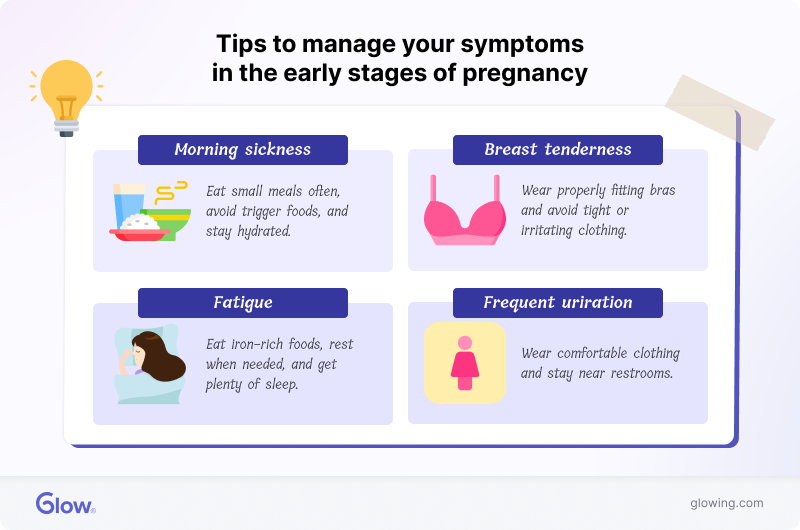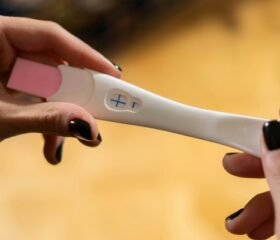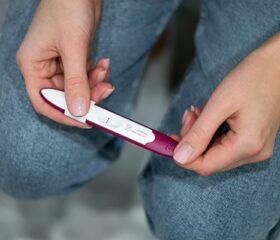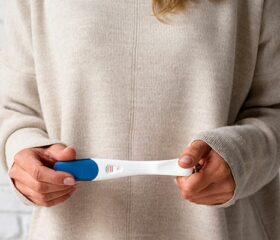Early Signs of Pregnancy: What to Look For and When to Take a Test
If you think you might be pregnant, first off, congratulations! It makes sense if you’re reading up on the signs of early pregnancy. These can vary widely, both from person to person and from one pregnancy to the next.

Some early pregnancy symptoms might hit you right away, while others might not appear until later (if they ever do).
What’s more, some of the most common symptoms—like feeling queasy or fatigued—can also crop up at other times, such as before your period or when you’re under stress.
We’ll walk you through the major signs to watch out for, but the only way to know for sure if you’re pregnant is to take a test.
What are the most common signs of early pregnancy?
Here are some of the most common early symptoms of pregnancy, all of which can manifest within just a few weeks of conception. Most of these are caused by hormonal changes in your body, and although some of them can be annoying, they’re all normal and usually aren’t anything to worry about. 1
Missing your period
This is arguably the most obvious early sign of pregnancy. After you conceive, your body produces hormones that stop you from ovulating and prevent your uterus from shedding its lining. This means you won’t get another period until after your baby is born.
Note that you can also miss your period for other reasons, including:
- Changes in your weight
- Hormonal imbalances
- Stress
If you skip your period and discover that you aren’t pregnant, it might be a good idea to see your doctor, especially if your menstrual cycle is usually pretty regular.
Missed periods are relatively common and don’t necessarily indicate you have any health problems, but changes in your cycle can sometimes indicate that something’s wrong. 2 When in doubt, it’s always better to be safe than sorry.
Nausea and vomiting
Morning sickness—nausea and vomiting—usually starts around week 4 to week 6 of pregnancy, though it can begin earlier. Despite the name, it can happen at any time of day, not just in the morning. 3
Fatigue
If you’re pregnant, you might find that you feel unusually tired all the time. Rising progesterone levels in your body, as well as increased blood volume and lower blood pressure, can contribute to this. 4
Fortunately, while early pregnancy fatigue can be unpleasant, it usually fades by the end of the first trimester (although it often returns in the third, and there are no guarantees, as every woman is different).
Spotting (implantation bleeding) or cramping
When your fertilized egg attaches to your uterine lining, it can cause light spotting (bleeding) or brownish discharge. This type of very early pregnancy discharge is known as implantation bleeding, and typically shows up 6 to 12 days after conception.
You might also have cramps, although they’ll probably be less intense than menstrual cramps. If you experience severe pain, particularly on just one side, consult with a doctor right away to rule out complications, such as an ectopic pregnancy.
Changes in your breasts
You may notice that your breasts change, becoming:
- Unusually sensitive
- Achey
- Swollen or “heavy”
The area around your nipples, known as your areolas, may darken as well.
Frequent urination
This is a fun one: because being pregnant can increase your blood volume, you may find yourself making near-constant trips to the bathroom. This is just as inconvenient as it sounds, but it’s also usually temporary.
Uncommon symptoms of early pregnancy
Some people experience additional symptoms in the early stages of pregnancy. Like the ones listed above, these are usually caused by hormonal changes.
All of these can also have other causes, so while they’re additional clues that you might be pregnant, they aren’t proof positive.
- Food cravings or aversions: You’ve probably heard of “pregnancy cravings” before. Pregnancy cravings can start as early as the first few weeks. You might also find that food you previously enjoyed seems unappealing, or that your sense of smell is heightened when you’re pregnant, rendering certain scents overwhelming.
- Strange tastes in your mouth: You might have a constant metallic taste in your mouth. This is one of the odder first-trimester symptoms you may experience, and it’s known as dysgeusia. 5
- Digestive issues: You might feel bloated during your pregnancy, overly “full,” or constipated—or, more bluntly, you might find that it’s hard to poop. On the flip side, you may also experience a spate of pregnancy diarrhea. Of course, many other conditions can cause these symptoms, too, so it’s best to confirm with a doctor.
- Mood swings: As you’ve probably gathered, when you first become pregnant, your hormones can go a little crazy. This can cause mood swings, which can vary in intensity. You might just find that you’re a little more irritable than normal, or you might experience intense emotional shifts around weeks 6 to 10, which is when pregnancy mood swings start.
- Headaches and dizziness: These are usually relatively mild, and are caused by shifts in your blood pressure and blood sugar levels.
- Nasal congestion: The increased blood flow we already mentioned can lead to nasal congestion, causing your nose to feel stuffy or runny. You may also experience minor nosebleeds.
How early can the symptoms of pregnancy begin?
Some people begin experiencing symptoms as soon as a week after conceiving, while others may not notice anything for several weeks. You might also find that your symptoms come and go.
If you’re anxious to learn whether you’re pregnant or not, this variability can be frustrating. The good news is that it’s normal; some people’s symptoms are highly noticeable, while other people’s are almost completely absent. Neither indicates a problem.
What else can cause these symptoms besides pregnancy?
As mentioned, many early pregnancy symptoms overlap with those of other conditions, such as:
- Premenstrual syndrome (PMS)
- Hormonal imbalances
- Stress
For example, fatigue, bloating, and mood swings are all common during PMS. It’s generally quite easy to mistake PMS symptoms for pregnancy symptoms.
Because these signs can occur for other reasons, the best (and only surefire) way to know for sure whether you’re pregnant is to take a test.
How early can you take a pregnancy test?
You can take a pregnancy test as soon as the day after your missed period. Some brands claim their tests work a few days before your missed period, but testing for pregnancy too early can result in a false negative result.
If you test early and get a negative result (or an ambiguous one, like a faint line on the pregnancy test) but still suspect you’re pregnant, just wait a few days and try again.
For even earlier detection, you can take a blood test from your healthcare provider. These tests can confirm pregnancy as soon as 6–8 days after conception, well before you miss your first period.
Note that there are several methods that you can supposedly use to DIY a pregnancy test with materials you have at home, like salt, toothpaste, sugar, or bleach. Don’t do this—none of these purported testing methods work. Always use an actual pregnancy test strip or digital test from a reputable manufacturer.
Abnormal symptoms that mean you should call your doctor
All of the symptoms we’ve listed so far are perfectly normal and don’t require medical attention—as long as they’re moderate. However, if your symptoms are unusually serious, that could point to a complication or a threatened miscarriage (a medical term that indicates you may be at risk of pregnancy loss).
Contact your healthcare provider if you experience any of the following:
- Sharp cramping or pain: Again, intense or localized cramps may indicate an ectopic pregnancy (implantation outside the uterus).
- Heavy bleeding: Heavy bleeding that soaks through a pad could be a sign of a miscarriage or another equally serious issue.
- Severe nausea: Particularly serious morning sickness is known as hyperemesis gravidarum. If you find that your nausea is unrelenting and that you can’t keep food or water down (which can cause dehydration), you might need treatment.
That list isn’t exhaustive, and if you have other symptoms that scare you or just make life miserable, it’s never a bad idea to see your doctor. Even if it turns out to be nothing, your peace of mind is important.
If you find out that you’re pregnant, book a prenatal visit and start taking vitamins
If it turns out that the signs are true and you’re pregnant—again, congratulations! Even if you don’t have any worrying symptoms, now’s a good time to schedule your first pregnancy appointment with a healthcare practitioner. Most people book this for the 8th week of pregnancy. You should also start taking prenatal vitamins with folic acid, which will aid your baby’s development.

Tips to manage your symptoms in the early stages of pregnancy
Even if your symptoms are relatively mild, they can still be unpleasant. Here are a few simple ways to ease some of them:
- Morning sickness: Eat small, frequent meals throughout the day instead of a few larger ones, and avoid food that makes you queasy. Be sure to stay hydrated.
- Fatigue: Try eating iron-rich food. In general, just listen to your body, and rest up when you need to. Get plenty of sleep and avoid strenuous chores.
- Breast tenderness: To combat breast pain during pregnancy, make sure that you wear bras that fit right (if your breasts have significantly swollen, you might need to get new ones). It can also help to avoid tight clothing or fabrics that you find irritate your skin.
- Frequent urination: You can’t stop your body from processing extra fluids, but wearing comfortable clothing and staying close to a restroom can minimize the hassle.
Don’t be afraid to lean on your partner, family members, or friends. They may be able to run errands for you and otherwise take some of the burden off your shoulders.
Final thoughts
It’s worth repeating that the signs of early pregnancy can vary widely. If you suspect you might be pregnant, the next step is to take a test and confirm it.
You’re entering an exciting chapter in your life. Regardless of whether your symptoms are mild or overwhelming, take care of yourself and keep an open line of communication with your doctor so that your pregnancy gets off to the best start possible.
Article Sources
- Office on Women's Health. "Body changes and discomforts" Retrieved April 16, 2025.
- Eunice Kennedy Shriver National Institute of Child Health and Human Development. "What are some common signs of pregnancy?" Retrieved April 16, 2025.
- MedlinePlus. "Morning sickness" Retrieved April 16, 2025.
- University of Rochester Medical Center. "First Trimester Fatigue" Retrieved April 16, 2025.
- Cleveland Clinic. "Dysgeusia" Retrieved April 16, 2025.







